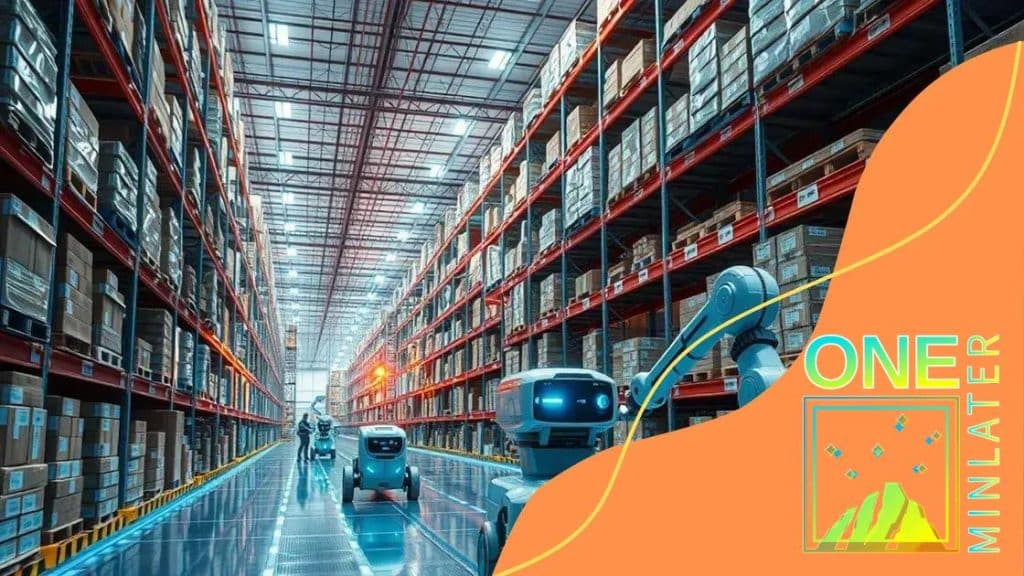How AI is improving supply chain management globally

AI is improving supply chain management globally by enhancing efficiency through predictive analytics, automation, and real-time data integration, while also promoting sustainability and minimizing operational costs.
How AI is improving supply chain management globally isn’t just a buzzword; it’s a transformative approach that businesses are adopting worldwide. Have you ever wondered how some companies manage to streamline their operations while others lag behind? This article explores the exciting advancements AI brings to the supply chain.
Understanding AI in supply chain management
Understanding AI in supply chain management is crucial for businesses looking to enhance their operations. Supply chains are complex systems, and AI helps simplify these processes. By leveraging data, AI tools can provide insights that lead to better decision-making and efficiency.
What is AI?
AI, or artificial intelligence, refers to machines that can perform tasks that typically require human intelligence. This includes learning, reasoning, and problem-solving. In the context of supply chains, AI technologies can analyze large amounts of data quickly, identifying patterns and trends.
How AI Benefits Supply Chains
- Increased efficiency: Automating routine tasks allows companies to focus on strategic goals.
- Improved forecasting: AI analyzes past data to predict future trends effectively.
- Cost reduction: Optimizing routes and inventory management can significantly cut operational costs.
These benefits are just the start. When businesses implement AI, they can transform their supply chains dramatically. Imagine a warehouse where robots handle picking and packing, freeing up human workers for more complex tasks. This may seem like science fiction, but it is becoming a reality.
Another example includes smart logistics systems using AI to track shipments in real-time. With better visibility, companies can respond quickly to any potential delays. AI also enhances customer satisfaction, as clients can receive timely updates about their orders.
Challenges in Implementing AI
While the advantages are clear, several challenges exist. First, there is the cost of implementing AI technologies. Many companies may find it challenging to invest in the necessary infrastructure. Additionally, training personnel to work alongside AI systems is crucial for success.
Furthermore, data privacy is a significant concern. Companies must ensure that the data used by AI systems complies with regulations and protects customer information. Balancing innovation with these challenges is essential for businesses attempting to leverage AI in their supply chains.
Ultimately, understanding AI within supply chain management is about recognizing both its potential and limitations. As more organizations adopt these technologies, continuous learning and adaptation will be key to mastering the process.
Key benefits of AI technology
The key benefits of AI technology are transforming supply chains around the world. Businesses are increasingly recognizing how AI can streamline operations, reduce costs, and improve overall efficiency. One of the most significant advantages is the ability to analyze vast amounts of data quickly, allowing companies to make informed decisions.
Enhancing Decision Making
With advanced algorithms, AI can identify trends and patterns that humans might miss. This leads to better forecasting and planning, ultimately resulting in a more agile supply chain. Companies can respond to market changes faster, ensuring they meet customer demands effectively.
Process Automation
Process automation is another major benefit of AI. By automating routine tasks, companies can free up employees to focus on more strategic activities. AI-driven systems can handle repetitive tasks such as data entry and inventory management, minimizing human error.
- Increased productivity: Automation allows staff to concentrate on high-value tasks.
- Accuracy: Fewer errors from human involvement mean better results.
- 24/7 operations: AI systems can work non-stop, providing consistent output.
As businesses implement AI, they often see improved workflow and communication. This technology can connect various parts of the supply chain, ensuring that everyone from suppliers to customers is in sync. When information flows smoothly, delays are minimized, enhancing the entire operation.
Another vital benefit is the improved customer experience that AI facilitates. Companies using AI can offer personalized services, predicting what customers want before they even ask for it. This leads to greater satisfaction and loyalty, as clients appreciate seamless interactions.
Cost Efficiency
Savings are a crucial consideration for any business. AI technology enables more efficient resource use, which often translates into lower costs. By optimizing inventory levels, companies can reduce excess stock, saving money on storage and management. Additionally, smarter logistics planning means less fuel consumption and better route efficiency.
In summary, the key benefits of AI technology in supply chain management range from enhanced decision-making to significant cost reductions. Embracing this innovative approach allows businesses to remain competitive and responsive in a rapidly changing marketplace.
Real-world applications of AI in logistics

Real-world applications of AI in logistics are changing the way companies operate. With the rise of artificial intelligence, logistics is becoming faster, smarter, and more efficient. Many businesses are adopting AI technologies to enhance their supply chain processes.
Smart Warehousing
One of the most significant applications is in smart warehousing. AI systems can monitor inventory levels in real-time, making it easier to manage stock. This technology helps optimize storage space and improve the picking process, ensuring that products are found quickly and efficiently.
Route Optimization
Another major advantage of AI is route optimization. AI algorithms analyze traffic patterns, weather conditions, and delivery schedules to find the best paths for transportation. This not only saves time but also reduces fuel costs, benefiting both the environment and the company’s bottom line.
- Enhanced delivery speed: Faster and more efficient delivery routes.
- Cost savings: Reduced fuel consumption through optimized routing.
- Improved customer satisfaction: Timely deliveries increase client trust.
In addition to these applications, AI is reshaping inventory management. By predicting demand, AI systems can help logistics managers maintain the right stock levels, minimizing excess and shortages. This predictive approach leads to more efficient operations and waste reduction.
AI-powered data analytics tools are also becoming increasingly important in logistics. These tools provide valuable insights into customer behavior and supply chain performance. By leveraging this data, businesses can make informed decisions and adjust their strategies to enhance overall efficiency.
Autonomous Vehicles
Furthermore, the use of autonomous vehicles in logistics is on the rise. These self-driving trucks and drones are being tested in several regions to transport goods efficiently. They can operate continuously without fatigue, offering significant improvements in delivery times and cost efficiency.
The coordination between AI technologies and human workers creates a collaborative environment that enhances productivity. For example, AI can assist with decision-making, allowing human staff to focus on more complex tasks while machines handle routine operations.
Overall, the real-world applications of AI in logistics are diverse and impactful. By adopting these technologies, companies can achieve operational excellence and stay competitive in a fast-evolving marketplace.
Challenges faced in AI implementation
Challenges faced in AI implementation are significant for many organizations striving to enhance their supply chain management. As companies look to integrate artificial intelligence into their operations, they encounter various obstacles that can hinder progress.
Financial Constraints
One of the primary challenges is the financial investment required for AI technology. Implementing AI solutions can be costly, and many companies may struggle to allocate the necessary funds. This financial burden can slow down the decision-making process and hinder the speed at which AI is adopted.
Data Quality Issues
Another significant hurdle is ensuring data quality. AI systems rely on accurate and reliable data to function effectively. If the data used is flawed or incomplete, it can lead to poor outcomes. Companies must invest time and resources in cleaning and organizing their data before implementing AI solutions.
- Importance of clean data: Accurate data is crucial for training AI systems.
- Data integration challenges: Different systems may store data in incompatible formats.
- Ongoing maintenance: Continuous data management is essential for sustained AI performance.
Moreover, employee resistance can pose a challenge when implementing AI technology. Workers may worry about job security or feel intimidated by new technologies. It is crucial for organizations to foster a culture that embraces AI and provide training to help employees adapt to these innovations.
Additionally, many companies face difficulties in finding skilled talent to manage and maintain AI systems. The demand for AI specialists surpasses supply, leading to a competitive job market. This lack of qualified professionals can delay implementation and limit the effectiveness of AI initiatives.
Regulatory and Ethical Concerns
Regulatory compliance is another important challenge. Companies must navigate complex legal frameworks and ensure they are adhering to regulations regarding data privacy and security. Ethical considerations surrounding the use of AI must also be addressed, particularly regarding bias and decision-making transparency.
Ultimately, companies pursuing AI implementation in their supply chains must be aware of these challenges. By understanding and addressing them, they can improve their chances of successful integration and maximize the benefits of AI.
Future trends of AI in supply chains
Future trends of AI in supply chains are shaping how businesses operate in an increasingly competitive market. As technology evolves, organizations are finding innovative ways to leverage artificial intelligence to enhance their processes. Predictive analytics is set to play a crucial role in this transformation.
Predictive Analytics
With predictive analytics, companies can anticipate customer demand and adjust their inventory accordingly. By analyzing historical data and trends, AI can forecast future needs, enabling businesses to optimize stock levels. This leads to more efficient operations and improved customer satisfaction.
Integration with IoT
The integration of AI with the Internet of Things (IoT) is another exciting trend. IoT devices collect vast amounts of data from various points in the supply chain. AI algorithms can analyze this data in real-time, providing insights that help streamline operations. Companies can track shipments, monitor equipment health, and manage resources more effectively with this combined technology.
- Real-time tracking: Enhanced visibility into supply chain operations leads to quicker responses.
- Better resource management: Data-driven insights help allocate resources efficiently.
- Improved customer experience: Real-time updates enhance communication with clients.
Automation will continue to be a significant trend in the future. As AI technologies advance, more tasks within supply chains will become automated. Robotics and AI-driven systems will handle everything from sorting and packing to delivery. This not only speeds up processes but also reduces human error and operational costs.
Additionally, AI will play a vital role in decision-making processes. Machine learning algorithms will analyze data, providing leaders with actionable insights to inform their strategies. Businesses that embrace this technology will gain a competitive edge, adapting quickly to market shifts.
Sustainability and AI
Sustainability will also become a focal point as companies increasingly recognize the importance of environmentally friendly practices. AI can help businesses minimize waste, optimize energy usage, and ensure that resources are used efficiently. By analyzing data from various sources, AI can recommend sustainable practices that positively impact the bottom line and the environment.
In summary, the future of AI in supply chains looks promising. From predictive analytics to automation and sustainability efforts, companies investing in these trends will be better positioned to thrive in a rapidly changing landscape. The integration of AI will not only enhance operational efficiencies but also contribute to a more sustainable future.
FAQ – Frequently Asked Questions about AI in Supply Chain Management
How does AI improve supply chain efficiency?
AI enhances supply chain efficiency by automating routine tasks, predicting demand, and optimizing processes, leading to cost savings and improved speed.
What role does predictive analytics play in supply chains?
Predictive analytics helps companies anticipate customer demand and adjust inventory levels accordingly, reducing waste and improving service levels.
What are some challenges companies face when implementing AI?
Challenges include financial constraints, data quality issues, employee resistance to change, and finding qualified personnel to manage AI systems.
How can AI contribute to sustainability in supply chains?
AI can help organizations optimize resource use, minimize waste, and implement eco-friendly practices, thus promoting sustainability in supply chain operations.





